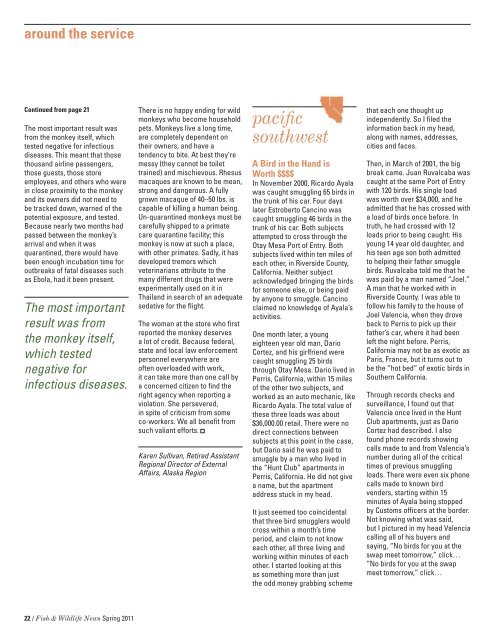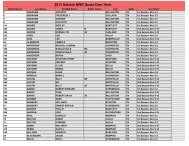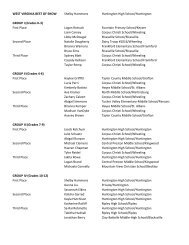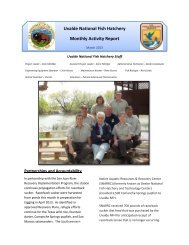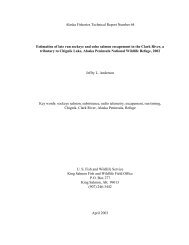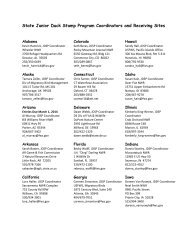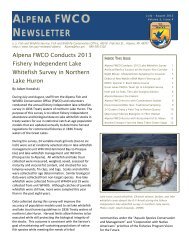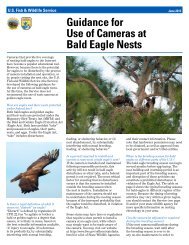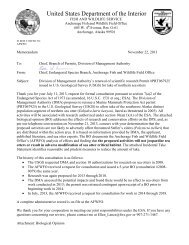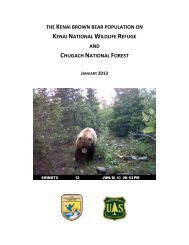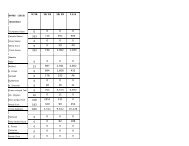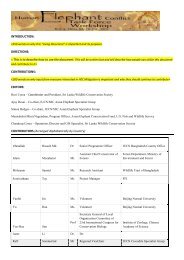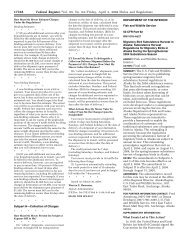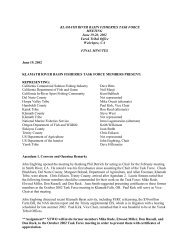Fish &Wildlife News - U.S. Fish and Wildlife Service
Fish &Wildlife News - U.S. Fish and Wildlife Service
Fish &Wildlife News - U.S. Fish and Wildlife Service
You also want an ePaper? Increase the reach of your titles
YUMPU automatically turns print PDFs into web optimized ePapers that Google loves.
around the service<br />
Continued from page 21<br />
The most important result was<br />
from the monkey itself, which<br />
tested negative for infectious<br />
diseases. This meant that those<br />
thous<strong>and</strong> airline passengers,<br />
those guests, those store<br />
employees, <strong>and</strong> others who were<br />
in close proximity to the monkey<br />
<strong>and</strong> its owners did not need to<br />
be tracked down, warned of the<br />
potential exposure, <strong>and</strong> tested.<br />
Because nearly two months had<br />
passed between the monkey’s<br />
arrival <strong>and</strong> when it was<br />
quarantined, there would have<br />
been enough incubation time for<br />
outbreaks of fatal diseases such<br />
as Ebola, had it been present.<br />
The most important<br />
result was from<br />
the monkey itself,<br />
which tested<br />
negative for<br />
infectious diseases.<br />
There is no happy ending for wild<br />
monkeys who become household<br />
pets. Monkeys live a long time,<br />
are completely dependent on<br />
their owners, <strong>and</strong> have a<br />
tendency to bite. At best they’re<br />
messy (they cannot be toilet<br />
trained) <strong>and</strong> mischievous. Rhesus<br />
macaques are known to be mean,<br />
strong <strong>and</strong> dangerous. A fully<br />
grown macaque of 40–50 lbs. is<br />
capable of killing a human being.<br />
Un-quarantined monkeys must be<br />
carefully shipped to a primate<br />
care quarantine facility; this<br />
monkey is now at such a place,<br />
with other primates. Sadly, it has<br />
developed tremors which<br />
veterinarians attribute to the<br />
many different drugs that were<br />
experimentally used on it in<br />
Thail<strong>and</strong> in search of an adequate<br />
sedative for the flight.<br />
The woman at the store who first<br />
reported the monkey deserves<br />
a lot of credit. Because federal,<br />
state <strong>and</strong> local law enforcement<br />
personnel everywhere are<br />
often overloaded with work,<br />
it can take more than one call by<br />
a concerned citizen to find the<br />
right agency when reporting a<br />
violation. She persevered,<br />
in spite of criticism from some<br />
co-workers. We all benefit from<br />
such valiant efforts.<br />
Karen Sullivan, Retired Assistant<br />
Regional Director of External<br />
Affairs, Alaska Region<br />
pacific<br />
southwest<br />
A Bird in the H<strong>and</strong> is<br />
Worth $$$$<br />
In November 2000, Ricardo Ayala<br />
was caught smuggling 65 birds in<br />
the trunk of his car. Four days<br />
later Estroberto Cancino was<br />
caught smuggling 46 birds in the<br />
trunk of his car. Both subjects<br />
attempted to cross through the<br />
Otay Mesa Port of Entry. Both<br />
subjects lived within ten miles of<br />
each other, in Riverside County,<br />
California. Neither subject<br />
acknowledged bringing the birds<br />
for someone else, or being paid<br />
by anyone to smuggle. Cancino<br />
claimed no knowledge of Ayala’s<br />
activities.<br />
One month later, a young<br />
eighteen year old man, Dario<br />
Cortez, <strong>and</strong> his girlfriend were<br />
caught smuggling 25 birds<br />
through Otay Mesa. Dario lived in<br />
Perris, California, within 15 miles<br />
of the other two subjects, <strong>and</strong><br />
worked as an auto mechanic, like<br />
Ricardo Ayala. The total value of<br />
these three loads was about<br />
$36,000.00 retail. There were no<br />
direct connections between<br />
subjects at this point in the case,<br />
but Dario said he was paid to<br />
smuggle by a man who lived in<br />
the “Hunt Club” apartments in<br />
Perris, California. He did not give<br />
a name, but the apartment<br />
address stuck in my head.<br />
It just seemed too coincidental<br />
that three bird smugglers would<br />
cross within a month’s time<br />
period, <strong>and</strong> claim to not know<br />
each other, all three living <strong>and</strong><br />
working within minutes of each<br />
other. I started looking at this<br />
as something more than just<br />
the odd money grabbing scheme<br />
that each one thought up<br />
independently. So I filed the<br />
information back in my head,<br />
along with names, addresses,<br />
cities <strong>and</strong> faces.<br />
Then, in March of 2001, the big<br />
break came. Juan Ruvalcaba was<br />
caught at the same Port of Entry<br />
with 120 birds. His single load<br />
was worth over $34,000, <strong>and</strong> he<br />
admitted that he has crossed with<br />
a load of birds once before. In<br />
truth, he had crossed with 12<br />
loads prior to being caught. His<br />
young 14 year old daughter, <strong>and</strong><br />
his teen age son both admitted<br />
to helping their father smuggle<br />
birds. Ruvalcaba told me that he<br />
was paid by a man named “Joel.”<br />
A man that he worked with in<br />
Riverside County. I was able to<br />
follow his family to the house of<br />
Joel Valencia, when they drove<br />
back to Perris to pick up their<br />
father’s car, where it had been<br />
left the night before. Perris,<br />
California may not be as exotic as<br />
Paris, France, but it turns out to<br />
be the “hot bed” of exotic birds in<br />
Southern California.<br />
Through records checks <strong>and</strong><br />
surveillance, I found out that<br />
Valencia once lived in the Hunt<br />
Club apartments, just as Dario<br />
Cortez had described. I also<br />
found phone records showing<br />
calls made to <strong>and</strong> from Valencia’s<br />
number during all of the critical<br />
times of previous smuggling<br />
loads. There were even six phone<br />
calls made to known bird<br />
venders, starting within 15<br />
minutes of Ayala being stopped<br />
by Customs officers at the border.<br />
Not knowing what was said,<br />
but I pictured in my head Valencia<br />
calling all of his buyers <strong>and</strong><br />
saying, “No birds for you at the<br />
swap meet tomorrow,” click…<br />
“No birds for you at the swap<br />
meet tomorrow,” click…<br />
22 / <strong>Fish</strong> & <strong>Wildlife</strong> <strong>News</strong> Spring 2011


